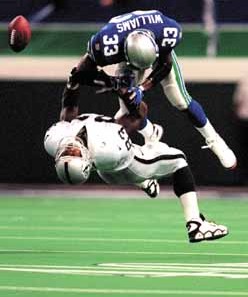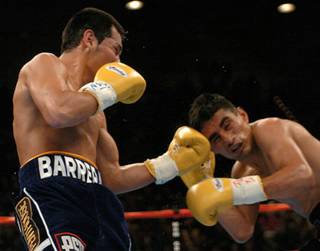Do Sports Make People Dumb?

Do the sports we love the most do the most harm?
In its December issue, Discover magazine has a great article by Barry Yeoman titled "Lights Out" that discusses the effect of playing sports on the brain.
Football and boxing have reputations as being hard hitting, violent sports. Athletes and fans know that the participants they watch are putting themselves on the line every time they compete. Boxing, especially, has a history of "punch drunk" veterans who are clear examples of brain damage.
What I never realized was that other sports, such as baseball and soccer, also have high rates of head injuries, according to the Discover article:
Football is hardly the only sport that knocks its athletes’ heads around. Hockey and baseball players also have their share of concussions, but the one that batters the most brains in the world is probably soccer. A soccer ball can travel as fast as 70 miles per hour in a professional game, and when players hit it with their heads they usually do so as hard as possible. An estimated 12.4 million children under the age of 18 now play soccer in America, and the explosion of interest has been most noticeable among girls. What do Giza’s findings mean for their developing brains? Can heading a soccer ball repeatedly cause brain injury?
The article goes on to say that speed and pace of your average high school soccer match does not lead to the potential injuries caused in professional leagues. The benefits of running around in athletic competition far outweigh the physical costs of hitting at home watching TV and eating junk food.
But what are the mental costs of playing sports, and how do we, the average fan, contribute to it?

Marco Antonio Barrera and Eric Morales fought each other recently in a fight that will be long remembered...hopefully.
Kevin Guskiewicz, research director of the Center for the Study of Retired Athletes at the University of North Carolina at Chapel Hill, noted a correlation between concussion and depression statistics.
Athletes with no concussions had a lifetime diagnosis rate of 6.6 percent, in line with the male population as a whole. Once they suffered three or more traumas, however, the rate skyrocketed to 20.2 percent. What’s particularly pernicious about retired football players’ depressions, Guskiewicz says, is that they can interact with other health problems to destroy the former athletes’ lives: “It’s sort of a snowball effect. You retire from football. You’re told at age 35 that you can’t do something you’ve been doing your entire life. You’re overweight. You are already beginning to develop musculoskeletal problems—sore knees, ankles, hips. Therefore, you begin thinking, ‘How am I going to take this weight off?’ But you’re depressed, you’re not eating right, your diet’s bad. You’re not exercising. You don’t have a strength coach now, a conditioning coach, a nutritionist overseeing your well-being. And, you know, things start to go downhill.”
Former New "York" Giant Harry Carson, who has been very open about the damage football does to players, and how it has affected his life.
Over 13 seasons, he estimates he received between 15 and 18 concussions. It was only toward the end of his career that he began to exhibit the cumulative effects of all these hits, signaling what his doctors would later call postconcussion syndrome. Carson developed headaches and muscle twitches. He grew sensitive to bright lights and loud noises, making it difficult for him to sit in a busy restaurant or do a television interview. He’d lose track of time: “It’d be Monday, and before I knew it, it’d be Thursday afternoon, and I didn’t fully understand what had transpired.” And then came the depression, hitting once or twice a month for no obvious reason. One day, while approaching New York’s Tappan Zee Bridge on his way to Giants Stadium, Carson’s mind took a macabre turn. “I should just drive the car right off the bridge,” he thought to himself. “All I have to do is just accelerate, go right through the guardrail, and that would be it.”
We as fans care so much for our teams and favorite athletes. We cheer them when they win, and are sad when the lose. However, when they retire, the fall pretty much out of sight. New heroes emerge, and old players fade away. There is no real support system for the retired athlete.
We as fans celebrate hard hitters, and question those who avoid them.
There is no shortage of athletes willing to pay the cost, and fans willing to pay for tickets. In many ways, we are all to blame when a sports star goes down.
Yet we will still watch. They will stay play.
Links of interest:
Center for the Study of Retired Athletes
Fightnews is a great boxing news site, with news and photos.
Previous sports stories.



2 Comments:
It will be repeated on cable a few times, so you'll be able to catch it.
There's no way Ward has been able to avoid brain damage. I remember seeing Thomas Hearns' interview after the Hagler fight, and he was slurring all of his words. There's a price to pay in boxing.
I was really suprised about soccer as well, but when the physics is broken down it makes sense.
I decided to install Haloscan trackbacks into my webpage. Keep in mind I've only been blogging for about two months and have no HTML background. I used their auto-install, which hid all of my existing comments. The past few days I've been trying to tweak the code to fix the problem -- a tough thing for me to do with no real background doing it.
Anyway, long story short, I found a three-character piece of code that caused the problem and fixed it.
Thanks for noticing.
Post a Comment
|<< Home